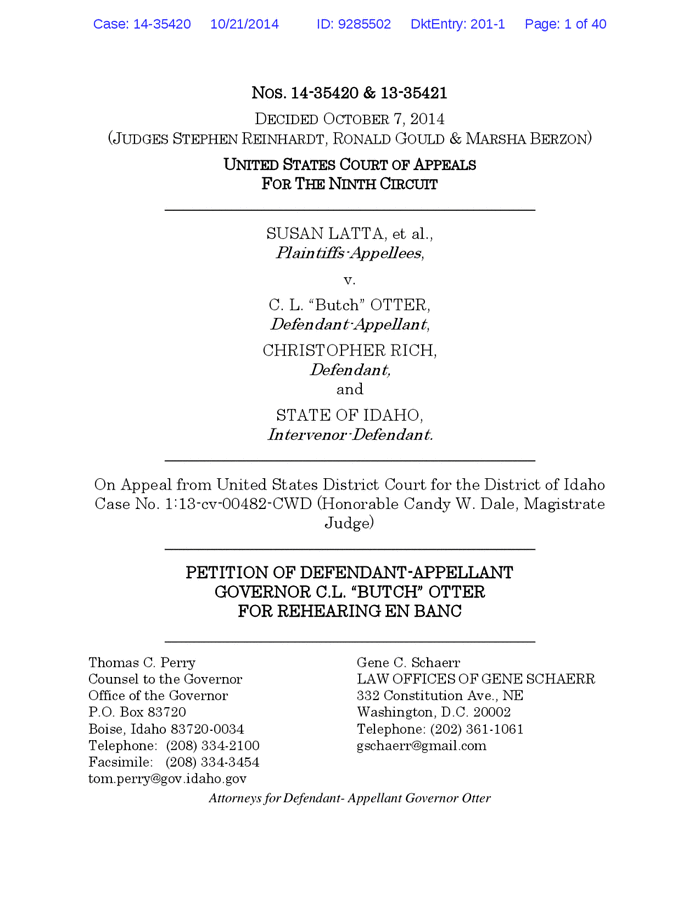
WASHINGTON — Idaho Gov. Butch Otter on Tuesday night asked the full 9th Circuit Court of Appeals to vote to reconsider the recent decision of a three-judge panel of the circuit that Idaho's ban on same-sex couples marriages is unconstitutional.
"This issue is also exceptional because, as a practical matter, redefining marriage by judicial fiat will undermine these social norms and likely lead to significant long-term harms to Idaho and its citizens, especially the children of heterosexuals," lawyers for Otter wrote in requesting en banc, or a full court, review of the decision.
In a broad attack on the decision of the three-judge panel that was written by Judge Stephen Reinhardt, Otter's lawyers, including Gene Schaerr, argued that the 9th Circuit's opinion "appears to be judicial policymaking masquerading as law."
Calling it "bad law," Otter's lawyers wrote that the decision conflicts with "numerous decisions of this Court, other circuits and the Supreme Court."
They also attacked the decision as "even worse policy," writing that it "creat[es] enormous risks to Idaho's present and future children—including serious risks of increased fatherlessness, reduced parental financial and emotional support, increased crime, and greater psychological problems—with their attendant costs to Idaho and its citizens."
The appeal request came almost a week after same-sex couples began marrying in Idaho. Although state officials had sought a stay on the ruling during its attempted further appeal, the Supreme Court denied the request — leading marriages to begin on Oct. 15.
In most federal circuits, an en banc request means that the full court would vote on whether to rehear the case and, if a majority votes for rehearing, all the judges would then rehear the case.
Because the 9th Circuit is so large — with 29 active judges — it has instituted a "limited en banc" procedure. If the judges vote for rehearing, 11 judges, not all 29, would hear the case. Under the rules, the "limited en banc" rehearing "shall consist of the Chief Judge of this circuit and 10 additional judges."
On Wednesday, Alaska Attorney General Michael Geraghty filed a similar request with the 9th Circuit Court of Appeals. Unlike the Idaho case, however, Geraghty is asking the judges to go from the trial court ruling striking down Alaska's ban on same-sex couples' marriages immediately to an en banc hearing.
"Absent en banc hearing, Alaska’s appeal will be controlled by Latta [the Idaho decision], which effectively guarantees the invalidity of all man-woman marriage laws in this circuit," Geraghty wrote in the court filing. "Appellants therefore respectfully ask the Court to grant initial en banc hearing to review the district court’s decision that the Equal Protection and Due Process Clauses of the Fourteenth Amendment compel Alaska’s citizens to license and recognize same-sex marriages."
Additionally, the 9th Circuit called for responses to the en banc rehearing requests in the Idaho and Nevada marriage cases, which prompted Nevada Gov. Brian Sandoval to announce that his state will oppose the rehearing request made by the Coalition for the Protection of Marriage.

